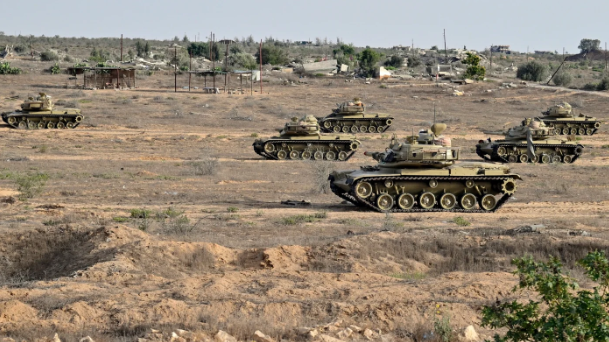A new report has uncovered a mass grave in North Sinai, which researchers say was likely used by the Egyptian military to bury the bodies of people extrajudicially killed in the area, reported the Middle East Monitor. The findings were published on Monday by the Sinai Foundation for Human Rights (SFHR), and analysed by UK-based research agency Forensic Architecture.
Since 2013, Egypt’s military has engaged in an operation against groups affiliated with the ‘Islamic State’ group in North Sinai. The military has been accused of committing grave human rights violations against the civilian population since the campaign began.
The report on Monday documented evidence of 36 human skulls at a mass grave near the city of El-Arish. It said the total number of bodies at the site was likely to be much higher, with many bodies unaccounted for.
The analysis was partly based on testimonies obtained by two members of army-aligned militias who admitted to transporting detainees to the mass grave for execution. They denied direct involvement in the killings. The report also included photos, video footage and field observations from SFHR researchers who visited the mass grave.
The evidence indicated that the site contained over 300 bodies buried in an improper manner. Many of the bodies were buried in full civilian clothing and shoes, the report noted, which is against traditional burial practices. Some skulls had blindfolds, which suggested extrajudicial killing.
Forensic Architecture used the evidence, as well as satellite imagery, to trace signs of military activity in the area, including the establishment of outposts. It also produced a 3D reconstruction of the mass grave, pinpointing the locations of the human remains that were uncovered.
In addition to the mass grave, the report also documents four previously unpublished incidents of extrajudicial killings of civilians in North Sinai. In these incidents, 25 men and three children are believed to have been killed.
“The evidence of a mass grave and dozens of documented extrajudicial killings in Sinai will remain an open wound that can only be healed by justice,” Ahmed Salem, executive director of SFHR, said.
“It is a reminder that behind every victim lies a person and a family denied their right to justice. These egregious violations, amounting to war crimes, were carried out by the army and police over years in the complete absence of accountability.”
One of the witnesses who came forward and provided his testimony said he did so because of the “ongoing suffering of hundreds of families among my neighbours and acquaintances, who have been waiting for seven or even 10 years to learn the fate of their disappeared loved ones.”
The former militia member said he believed that those disappeared people had been executed and buried in mass graves. The two witnesses submitted a list of names, together with what they said were approximate burial locations and execution dates. They said that many of those killed were not armed fighters, but people suspected of involvement with militant groups without any conclusive evidence.
In numerous reports, SFHR has documented extrajudicial killings carried out by Egypt in North Sinai which authorities claimed were “armed clashes”.
According to SFHR, based on military statements, 5,053 have been killed by Egyptian forces between 2013 and 2022 accused of being “terrorists”. A further 14,837 others have been arrested.
However, researchers estimated that in mid-2018, the number of IS-aligned fighters in North Sinai ranged between 1,000 and 1,500.
The report said that extrajudicial killings and executions without trial were grave violations of international human rights law, and could be crimes against humanity if carried out systematically. “The crimes committed against the people of Sinai during the years of war cannot serve as a foundation for justice, security, or sustainable social peace,” said Salem.
“Only truth and justice can provide that. Thousands of families who endured abuse and suffering are still seeking truth and justice, no matter how much time passes or how secure some may feel from accountability.”
SFHR further called on the UN Human Rights Council to establish an independent committee to investigate Egyptian violations committed in the Sinai peninsula during the military campaign.
Additionally, Sinai inhabitants have also been displaced en masse by Egyptian authorities.




